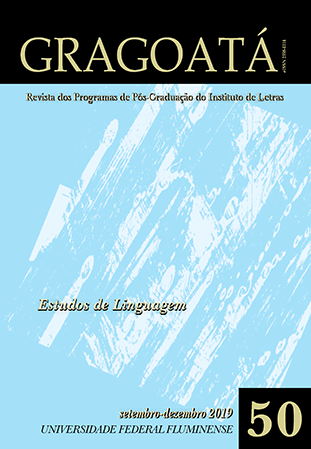Uma análise do aconselhamento “Por que você deve votar em Bolsonaro?”, do pastor Silas Malafaia, no canal do Youtube: produção e recepção de discursos nas redes sociais, sob a perspectiva semiolinguística
DOI:
https://doi.org/10.22409/gragoata.v24i50.34166Palavras-chave:
discurso religioso, discurso político, redes sociais digitais, eleições presidenciais.Resumo
Este trabalho faz parte de um projeto mais amplo que visa estudar a articulação entre os domínios de prática discursiva religioso e político, efetivada por meio das novas tecnologias digitais de comunicação. Este artigo tem por objetivo analisar a situação de comunicação, tanto do ponto de vista da instância de produção quanto da instância de recepção, de um aconselhamento promovido pelo pastor Silas Malafaia, no seu canal do Youtube, incitando os internautas a votarem no então candidato à presidência da República Jair Bolsonaro. Para isso, partimos de um estudo do esquema enunciativo e da organização argumentativa do discurso focalizado, incluindo uma reflexão sobre a identidade discursiva construída pelo enunciador, para, em seguida, analisar a sua repercussão entre os internautas. Procuramos abordar a produção e a recepção do discurso no escopo da Teoria Semiolinguística do Discurso, de Patrick Charaudeau (2001, 2006, 2008, 2010). O estudo constatou que o pastor concilia, em sua fala, componentes das formações discursivas religiosa e política, recorrendo a categorias linguísticas, ordenadas em função da finalidade de incitação, e materializadas por procedimentos ligados à organização argumentativa do discurso. Verificou, também, que as reações dos internautas, reveladas pelos comentários publicados, revelam vozes dissonantes, que caracterizam a plataforma como um espaço de polêmica. Tudo isso contribui para a construção do capital social do enunciador e, consequentemente, do candidato que ele tenta promover.
Downloads
Downloads
Publicado
Edição
Seção
Licença
AUTORIZAÇÃO
Autores que publicam em Gragoatá concordam com os seguintes termos:
Os autores mantêm os direitos e cedem à revista o direito à primeira publicação, simultaneamente submetido a uma licença Creative Commons Atribuição 4.0 Internacional (CC BY 4.0), que permite o compartilhamento por terceiros com a devida menção ao autor e à primeira publicação pela Gragoatá.
Os autores podem entrar em acordos contratuais adicionais e separados para a distribuição não exclusiva da versão publicada da obra (por exemplo, postá-la em um repositório institucional ou publicá-la em um livro), com o reconhecimento de sua publicação inicial na Gragoatá.
A Gragoatá utiliza uma Licença Creative Commons - Atribuição CC BY 4.0 Internacional.











